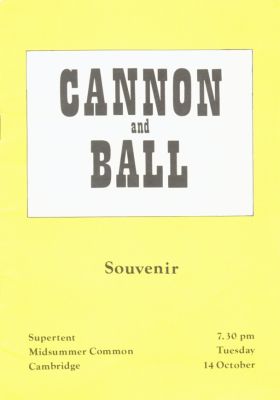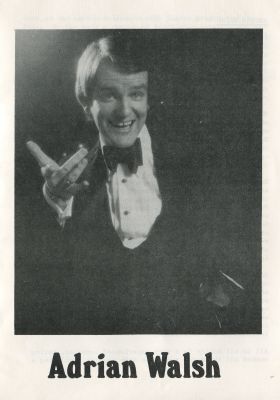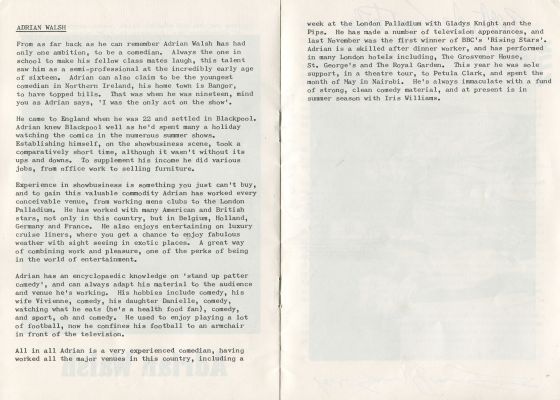
Cannon and Ball

 The rise of Cannon and Ball to becoming one of the most consistently “in demand”, double acts in the country is one of real success. Success that can be measured in the respect and admiration of their fellow artist’s, and the loyalty of their growing audiences.
The rise of Cannon and Ball to becoming one of the most consistently “in demand”, double acts in the country is one of real success. Success that can be measured in the respect and admiration of their fellow artist’s, and the loyalty of their growing audiences.
The Cannon and Ball story is one of talent, hard work and continual striving for perfection. This dedication is amply demonstrated nightly when they ‘top the bill’ at many of the country’s leading cabaret clubs and theatres.
There cannot be many artist’s today, who are kept as busy as Cannon and Ball. But their success is no accident. It has been hard won.
Although neither Tommy Cannon nor Bobby Ball were born into theatrical families, they each discovered at an early age a natural talent for entertaining. Bobby Ball remembers many occasions when, with his sisters he sang impromptu lunchtime concerts at the various cotton mills in his Lancashire hometown of Shaw.
It was in 1961 that Cannon and Ball first worked together, not as entertainers but as welders for a North West Engineering Company. It was here that their unique chemistry interacted and their stage relationship developed.
Tommy Cannon (slightly senior) befriended the young recruit, “Tommy used to look after me when I got us into trouble” (Bobby Ball). As their friendship developed comic possibililies began to suggest thernselves. “We were always fooling about for the lads at work” (Tommy Cannon).
Encouraged by an enthusiastic response at work, they would often be found in the evenings entertaining a wider audience. For his part of homely Lancashire is still the guardian of the music hall tradition. Talent shows and social clubs still play an active part in the community. It was to these that Cannon and Ball turned.
Initially they performed as a singing duo. “I used to sing” recalls Bobby Ball “and Tommy would accompany me on the drums, then we would swap over and Tommy would sing to my accompanyment – all for �3 a night”
However, their talent for comedy soon began to enter the act. Comedy, entirely original and unique; comedy, loosely based on their working relationship as welders.
As the act began to develop through their many appearances in the pubs and social clubs of South East Lancashire, they began to look for opportunities outside their native area. As their appearances increased and confidence grew, it soon became evident that engineering would have to survive without them.
In 1963 Cannon and Ball vere offered a series of bookings by a London agent. Although this promise did not always live up to their expectations at least they had taken the opportunity to enter showbusiness.
Working mainly in social clubs in the North of England, Cannon and Ball can look back at overcoming some of the toughest audiences in the country. Lesser artist’s have not survived these most demanding and discriminating audiences. Cannon and Ball not only survived, but learned how to build a following whose loyalty and affection is the envy of many artist’s.
After two years, Cannon and Ball started to attract attention outside the North of England. In 1965, they began to appear throughout the country. It was now that their earlier tough apprenticeship proved invaluable. They were quickly able to overcome many of the problems that some northern comedians experience when appearing outside their region. Never having to rely on dialect or stories, their zany style needed only subtle changes.
In 1970-72, Cannon and Ball undertook tours to Australia and South Africa for cabaret and radio work.
They have made several television appearances to date, both for the BBC and various independent television companies, including a series of “Bruce Forsyths Big Night Out” for London Weekend, and their own “Cannon and Ball at the Wheeltappers” for Granada.
In Britain their national reputation has continued to grow.
Since 1975, Cannon and Ball have regularly appeared during pantomime seasons at the “Alhambra” (Bradford), “Grand” (Leeds), “Davenport” (Stockport) and in 1978 at the “Empire” (Liverpool). The same period has seen them topping the bill in Summer Seasons at the “Winter Gardens” (Bournemouth), “Behane Night Spot (Jersey), “The Pier” (Cleethorpes) and “Wellington Pier” (Great Yarmouth).
Few acts in the country today can obtain such a wide range of responses from an audience. The quickly changing “love/hate” relationship from Tommy Cannon to Bobby Ball in their act is based on masterly timing and knowing how to “work an audience”. The pathos and sympathy extertded to the rejected Bobby Ball and the animosity towards Tommy Cannon, who refuses his partner’s friendship, is clearly based on their early experiences.
In the Autumn of 1978, Cannon and Ball undertook a nationwide tour with the American Singer, Gene Pitney, appearing at the London Palladium and other major theatres and concert halls.
Cannon and Ball can justifiably feel pleased with their progress to date, but the two ex-welders have a restless spirit and many ambitions to fulfil.
A record album has been suggested. Their own comedy series for a major television company is a strong possibility. The next few years should establish Cannon and Ball amongst the top British comedians. Certainly that would be no surprise to their enormous following, but to everyone who has seen their work. Morecambe and Wise named them “the next big double act”
With the continual encouragement of Stuart Littlewood of Kennedy Street Artist’s the ex-welders from Oldham have come a long way. With their perfect timing and their flexibility to play any audience, it is easy to see why Cannon and Ball are so much sought after as stars in Britain’s cabarets and theatres. “Rock on Tommy”
Following the success of their recent television series Cannon and Ball are now firmly established as one of Britain’s leading entertainment attractions, and are currently breaking all box office records.
Wout Steenhuis
 Wout hails from Holland but settled in England shortly after the war. In his native country he was already known as the guitarist of the famous Orchestra of the Dutch Swing College (still going strong today). At the end of the war his Dutch Resistance activities caught up with him and a serious shot wound could well have ended his career. But, thanks to treatment in a British Army hospital, his arm was saved and he could play his guitar again,
Wout hails from Holland but settled in England shortly after the war. In his native country he was already known as the guitarist of the famous Orchestra of the Dutch Swing College (still going strong today). At the end of the war his Dutch Resistance activities caught up with him and a serious shot wound could well have ended his career. But, thanks to treatment in a British Army hospital, his arm was saved and he could play his guitar again,
His early reputation was as a solo Jazz, Ballad and Hawaiian guitarist, but in addition his claim to fame now are his multi-track performances. Shades of Les Paul, maybe, but there is one vital difference: Wout sings and plays everything himself, using a choir of his own voices, guitars, Hawaiian guitar, drums, bass, electric and acoustic pianos, organ, ukelele, and latin-american rhythm instruments, all recorded in his own stereo studios. A one-man orchestra and choir is the end product.
From the stage/cabaret floor Wout controls the playing of backing tapes which contain his own pre-recorded orchestral and vocal accompaniments. At the same time, live through his own mixer/amplifier/mike equipment he adds the melody lines on guitar, Hawaiian guitar and vocals. It is not just a gimmick, but an impressive live performance in which he reproduces the sounds and songs audiences know so well from his records and broadcasts. AND: he is self-contained – needs no backing, bandcalls or p.a.
His material ranges from top-twenty songs to ballads and Hawaiian (Wout’s speciality) and includes vocals, not just in English but where required in French, Dutch, German, Spanish, Hawaiian and Maori. His easy-going chat and amusing stories linking his songs and his sounds deserve special mention. Altogether a style which particularly suits “middle of the road” audiences in theatres and clubs.
Over the last dozen years Wout has been on the air almost weekly, both on BBC Radio 1 and 2, and his name is a household word. His broadcasts exceed 1000, to which we can add over 100 TV appearances, which include his own two weekly series on Southern TV, both extended, and guestspots in virtually all the top shows.
Wout has played all the top spots in the U.K. and many abroad. At random we quote: Blazers/Windsor, Palladium/ London, Golden Garter/Manchester, Night Out/Birmingham, Double Diamond, Stardust, New Crests, Crystal Rooms/Hereford, Quaglinos/London, Aquarius/Chesterfield, Trocadero, Aphrodites/London, Talk of the Midlands, Caesar’s/Luton, Wakefield Theatre Club, etc and abroad: various CSE tours, The Southern Sun Hotel chain, Bacchus/Nairobi, all six world cruises on the Cunard QEII, world cruise Holland-America Line, The Hilton Hotel chain, 1980 World cruise P and O “Canberra”, Bermuda, New Zealand, Spanish/Dutch/German/Italian TVs, etc, etc.
With 27 L.P.s so far to his credit, Wout is an EMI, Philips and Polydor recording star established since 1965. He has sold over a million and a half L.P.’s so far. His L.P.s, cassettes and cartridges are available under a variety of labels in most countries.
Adrian Walsh

 From as far back as he can remember Adrian Walsh has had only one ambition, to be a comedian. Always the one in school to make his fellow class mates laugh, this talent saw him as a semi-professional at the incredibly early age of sixteen. Adrian can also claim to be the youngest comedian in Northern Ireland, his home town is Bangor, to have topped bills. That was when he was nineteen, mind you as Adrian says, ‘I was the only act on the show’
From as far back as he can remember Adrian Walsh has had only one ambition, to be a comedian. Always the one in school to make his fellow class mates laugh, this talent saw him as a semi-professional at the incredibly early age of sixteen. Adrian can also claim to be the youngest comedian in Northern Ireland, his home town is Bangor, to have topped bills. That was when he was nineteen, mind you as Adrian says, ‘I was the only act on the show’
He came to England when he was 22 and settled in Blackpool. Adrian knew Blackpool well as he’d spent many a holiday watching the comics in the numerous summer shows. Establishing himself, on the showbusiness scene, took a comparatively short time, although it hasn’t been without its ups and downs. To supplement his income he did various jobs, from office work to selling furniture.
Experience in showbusiness is something you just can’t buy, and to gain this valuable commodity Adrian has worked every conceivable venue, from working mens clubs to the London Palladium. He has worked with many American and British stars, not only in this country, but in Belgium, Holland, Germany and France. He also enjoys entertaining on luxury cruise liners, where you get a chance to enjoy fabulous weather with sight seeing in exotic places. A great way of combining work and pleasure, one of the perks of being in the world of entertainment.
Adrian has an encyclopaedic knowledge on ‘stand up patter comedy’ and can always adapt his material to the audience and venue he’s working. His hobbies include comedy, his wife Vivienne, comedy, his daughter Danielle, comedy, watching what he eats (he’s a health food fan), comedy, and sport, oh and comedy. He used to enjoy playing a lot of football, now he confines his football to an armchair in front of the television.
All in all Adrian is a very experienced comedian, having worked all the major venues in this country, including a week at the London Palladium with Gladys Knight and the Pips. He has made a number of television appearances, and last November was the first winner of BBC ‘Rising Stars’. Adrian is a skilled after dinner worker, and has performed in many London hotels including The Grosvenor House, St. George’s and The Royal Garden. This year he was sole support, in a theatre tour, to Petula Clark, and spent the month of May in Nairobi. He’s always immaculate with a fund of strong, clean comedy material, and at present is in summer season with Iris Williams.
Ritz

The best of British, that’s Ritz.
The best black talents in Britian today, together in one three piece group. Ritz began as an idea in the mind of producer Ken Gold. The idea was as simple as all good ideas should be, and as sound as they have to be to work.
Ken wanted to find the best black voices in this country, and by combining them in one band, come up with a unit that could beat the worlds. The band would be aimed specifically at cracking the American stranglehold in disco music with a homegrown group that could get down with the best of them.
He approached manager Brian Leahy with the idea, and together they began putting names together to see if the magical combination would suggest itself. The search was on.
Looking for a beat that satisfied both Ken and Brian was not easy, but in the end they found two of Britain’s most in demand session singers, Tony Jackson and Ruby James, who together with a virtual new discovery, Kofi Missah, became Ritz.
Their first album ‘Puttin’ On The Ritz’ includes their highly acclaimed re-make of Little Eva’s sixties smash, ‘Locomotion’ which New Musical Express described as ‘The best in its class’ and Black Echoes called ‘a dance floor killer’. The band were making a lot of friends around the UK with a string of personal appearances, when the single took off in France. Within a couple of months it had sold a million in territories as far apart as Australia and Holland.
To further enhance their vocal sound they added old friend Jimmy Chambers to the line up, and their world wide success helped them win a weekly television slot as the regular group on the popular comedy series ‘Cannon and Ball’
Ruby James’s musical roots trace back to her childhood when she first discovered she wanted to be a singer and, steadily pursuing her goal, began to take voice lessons. She explains I was asked to sing with a band that was gonna be called The Stacks, then it became Ruby James and The Stacks, and since then I’ve gone on to record and/or perform with Rod Stewart; Cat Stevens, Jimmy Cliff; Linda Lewis; Heatwave and quite a few others.
“Just before joining Ritz,” she continues, “I was on tour in New Zealand and Brian heard about the Ritz project and suggested I go ahead and try that. It was like a homecoming because although I had never met Kofi, I had worked with Tony and Jimmy in a croup called “Midnight.”
Kofi Missah, on the other hand, is the youngest member of the group and therefore has the least experience of the three. “I haven’t been out there quite as long as Ruby and Tony, but I’ve been going for quite a while now because I started as a dancer when I was 12.”
“A few years later a friend of my father’s needed a lead singer and he knew I sang. So I joined the group and I was their lead singer until my father moved from Germany to England, where I finally joined a group called Sugarcane through whom I met my personal manager who put me in contact with Ritz.”
Tony, who is the senior member of Ritz, begins his story with a modest statement. “I don’t want to sound flashy,” be grins, “but if someone in London were to say they need a black voice to do such and such a thing, my name would automatically be mentioned.
“But” he continues, “it’s take years and years to work up to this standard. You know, years of doing jingles, TV adverts and voice overs. It all really started when I first left my native Barbados to go to London in 1965. I got to London and began doing all kinds of sessions with various groups. The first big thing I did was The Sammy Davis Show. It was a charity show, but my God! working with Sammy Davis Jr – who cared about money!! Apart from that were a lot of tours with people like Ray Charles; Cleo Lane; Billy Preston, Stevie Wonder – that was one of my best gigs – Edwin Starr and The Three Degrees.”
Jimmy Chambers came to England from Trinidad in 1964 and while still in college he began working in groups. One band, called Dada, including Elkie Brooks and Paul Korda. Like Tony he was much in demand for advertisements (Martini, Cadbury’s etc.) and for session work. As well as singing, Jimmy writes songs and loves arranging music. Having worked with Tony and Ruby in Midnight he was a natural choice as the fourth member of Ritz.
All of this talent has been pulled together to form Ritz, a fresh stylish English group certain to add a new dimension to the market. Believe me, before too long, everybody is gonna be putting on The Ritz.